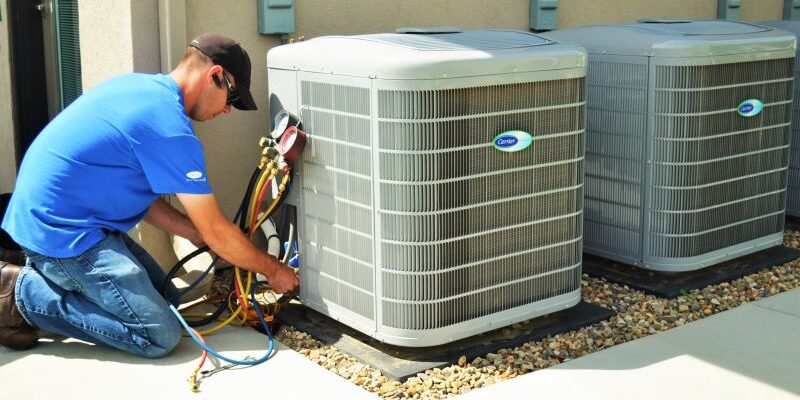What Does an AC Tune-Up Involve?

Air conditioning is incredibly useful – so much so that almost 90% of homes in the US have an AC unit installed.
While having AC can be great, you need to make sure you look after your system. If you don’t, it could degrade and break down. Regular HVAC maintenance will keep it in good shape so you can have a comfortable home at all times.
From time to time, you’ll want to get an AC tune-up. This guide will cover everything that’s involved. Keep reading for more.
The Importance of AC Tune-Ups
No matter how well-designed your system is, regular AC maintenance is essential. Dirt, dust, and moisture can build up quickly, and these will affect how your AC unit performs. Some components can even be susceptible to microbial growth, which could make the air in your home potentially harmful.
Issues like these need to be dealt with, and the sooner the better. The longer they’re left, the more harm they can cause to your AC system. This will shorten its lifespan, so you’ll end up having to pay more to replace it.
Some regular maintenance tasks you can take care of yourself. Cleaning or replacing an air filter, for example, is fairly simple. There are various other tasks, however, that should only be tackled by someone with the right training and experience.
A professional technician will be able to take a look at your entire system to make sure everything is in good order. This will involve checking cooling systems, cleaning vital components, and inspecting for any signs of damage or degradation.
There can be early warning signs of larger issues that most people wouldn’t notice. A professional technician can spot these and will be able to resolve any issues before they grow into major problems.
People often choose to avoid AC tune-ups as they don’t want to spend the money. It’s generally far more cost-effective, however, to ensure you have at least annual AC servicing done.
The cost is much lower than you’re likely to pay if your unit develops any larger issues. Preventative maintenance is key if you want to avoid downtime and save money.
Signs That It’s Time for an AC Tune Up
Most AC companies recommend an annual AC tune-up. It’s best to do this in the spring if you can so that your system is good to go as the warmer weather starts.
You should schedule regular HVAC maintenance, but even if you do, issues can still arise unexpectedly. There are various signs you can look out for that indicate something is wrong with your system.
One thing you might notice is that your energy bill has gone up unexpectedly. If there’s a problem with your AC unit, it may have to work harder to maintain the temperature you set it to. In this case, it will use more energy, causing your utility bills to spike.
Alternatively, it may use the same amount of energy, but not perform as well. You might notice that it’s not cooling your home as well or the airflow has weakened. This shows that it’s struggling to keep up and is a clear sign that something is wrong with it.
Higher humidity in your home is another sign of a functional issue. Your system might also turn itself on and off on its own.
In any of these situations, you’ll want a professional to take a look. These problems won’t get better on their own, so it’s best to sort them out sooner rather than later to minimize the cost of repairs.
What Does an AC Tune-Up Include?
If there’s a specific problem, a technician will be able to handle it as needed. For a standard tune-up, there are several things that you can expect them to do.
Checking Your Thermostat and Settings
One of the first things a technician will check is the thermostat settings. A malfunctioning thermostat will likely prevent your AC unit from functioning properly. They’ll ensure it’s working and set to your desired temperature.
Inspecting Your AC Unit
They’ll then take off the front panel of your air conditioner to inspect the various components. They’ll do this to look for any signs of damage or wear such as rust, corrosion, or water damage. If they find any damaged parts, they’ll recommend what should be replaced to fix the issue.
Cleaning Your Evaporator and Condenser Coils
Next, they’ll clean the evaporator and condenser coils. If these parts are dirty, your system won’t be able to cool the air properly. This will reduce the overall efficiency which can cause it to not cool your home efficiently, or make it use more energy.
Checking Coolant levels
If your coolant level is low, your system won’t cool air as it should. If it’s reached a point where it’s completely empty, it won’t cool the air at all and you’ll just be blowing warm air into your home.
Inspecting the Condensate Drain Line
Condensation forms on your unit through regular use and this condensation is carried out through the condensate drain line. If this line is damaged or clogged, this condensation will remain in the unit. Most units have sensors that will shut it off if it detect this issue, so you won’t be able to use it.
Scheduling Your AC Tune-Up
It’s important to look after your AC unit if you want to keep it functional and in good shape. Scheduling a regular AC tune-up will help keep it running all year round.
Advanced Mechanical, Inc. is a professional residential and commercial HVAC and plumbing services company. Take a look at our AC Services page today to see how we can help you.
